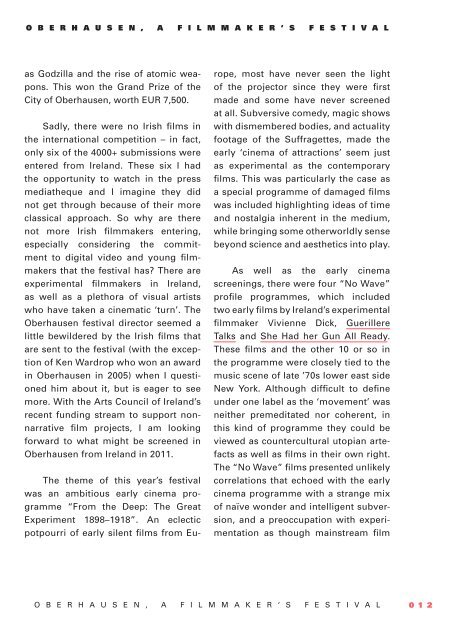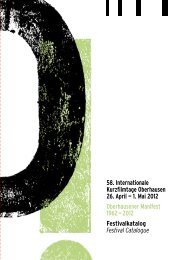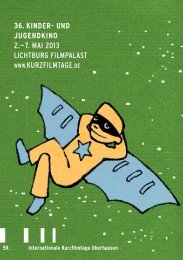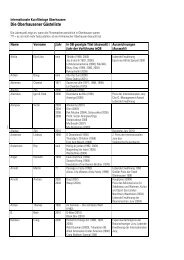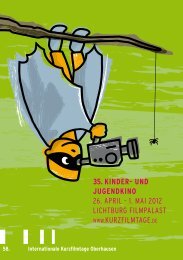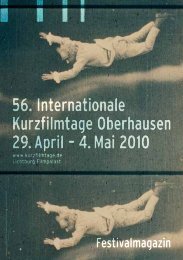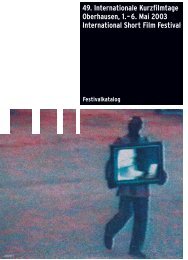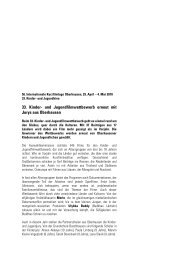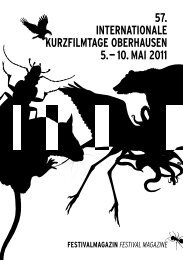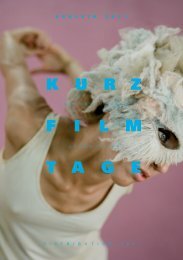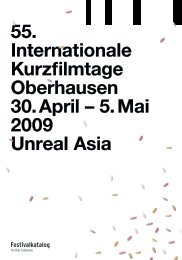The International Short Film Festival Ober - Internationale ...
The International Short Film Festival Ober - Internationale ...
The International Short Film Festival Ober - Internationale ...
Create successful ePaper yourself
Turn your PDF publications into a flip-book with our unique Google optimized e-Paper software.
O B E R H A U S E N , A F I L M M A K E R ‘ S F E S T I V A L<br />
A R E P O R T<br />
as Godzilla and the rise of atomic weapons.<br />
This won the Grand Prize of the<br />
City of <strong>Ober</strong>hausen, worth EUR 7,500.<br />
Sadly, there were no Irish films in<br />
the international competition – in fact,<br />
only six of the 4000+ submissions were<br />
entered from Ireland. <strong>The</strong>se six I had<br />
the opportunity to watch in the press<br />
mediatheque and I imagine they did<br />
not get through because of their more<br />
classical approach. So why are there<br />
not more Irish filmmakers entering,<br />
especially considering the commitment<br />
to digital video and young filmmakers<br />
that the festival has? <strong>The</strong>re are<br />
experimental filmmakers in Ireland,<br />
as well as a plethora of visual artists<br />
who have taken a cinematic ‘turn’. <strong>The</strong><br />
<strong>Ober</strong>hausen festival director seemed a<br />
little bewildered by the Irish films that<br />
are sent to the festival (with the exception<br />
of Ken Wardrop who won an award<br />
in <strong>Ober</strong>hausen in 2005) when I questioned<br />
him about it, but is eager to see<br />
more. With the Arts Council of Ireland’s<br />
recent funding stream to support nonnarrative<br />
film projects, I am looking<br />
forward to what might be screened in<br />
<strong>Ober</strong>hausen from Ireland in 2011.<br />
<strong>The</strong> theme of this year’s festival<br />
was an ambitious early cinema programme<br />
“From the Deep: <strong>The</strong> Great<br />
Experiment 1898–1918”. An eclectic<br />
potpourri of early silent films from Europe,<br />
most have never seen the light<br />
of the projector since they were first<br />
made and some have never screened<br />
at all. Subversive comedy, magic shows<br />
with dismembered bodies, and actuality<br />
footage of the Suffragettes, made the<br />
early ‘cinema of attractions’ seem just<br />
as experimental as the contemporary<br />
films. This was particularly the case as<br />
a special programme of damaged films<br />
was included highlighting ideas of time<br />
and nostalgia inherent in the medium,<br />
while bringing some otherworldly sense<br />
beyond science and aesthetics into play.<br />
As well as the early cinema<br />
screenings, there were four “No Wave”<br />
profile programmes, which included<br />
two early films by Ireland’s experi mental<br />
filmmaker Vivienne Dick, Guerillere<br />
Talks and She Had her Gun All Ready.<br />
<strong>The</strong>se films and the other 10 or so in<br />
the programme were closely tied to the<br />
music scene of late ’70s lower east side<br />
New York. Although difficult to define<br />
under one label as the ‘movement’ was<br />
neither premeditated nor coherent, in<br />
this kind of programme they could be<br />
viewed as countercultural utopian artefacts<br />
as well as films in their own right.<br />
<strong>The</strong> “No Wave” films presented unlikely<br />
correlations that echoed with the early<br />
cinema programme with a strange mix<br />
of naïve wonder and intelligent subversion,<br />
and a preoccupation with experimentation<br />
as though mainstream film<br />
did not exist yet! Of course, the “No<br />
Wave” filmmakers were certainly more<br />
self-conscious in their style. Although<br />
many films here were a treat to see,<br />
certain key works were also omitted,<br />
leaving the feeling that “No Wave” was<br />
about style over substance which more<br />
content-inspired “No Wave” filmmakers<br />
would surely debate was not the case.<br />
This was my first experience of the<br />
<strong>Ober</strong>hausen festival and it has quickly<br />
become ‘my’ festival, as I plan to return<br />
every year. <strong>International</strong> in scope, it still<br />
manages to operate on a very human<br />
scale, perhaps because of its location<br />
– there is not much else to do in <strong>Ober</strong>hausen<br />
besides the festival, so there is a<br />
summer-camp immersion atmosphere,<br />
where for one extended weekend, a<br />
tiny nation seems to develop, a fantasy<br />
of citizens who live their lives through<br />
all things celluloid and digital. So what<br />
more can I say – a call to arms ye filmmakers<br />
of Ireland: get your montage<br />
skills flexing and send your submissions<br />
to the filmmakers’ film festival.<br />
•<br />
Treasa O’Brien is a filmmaker, writer and<br />
curator. She lives in London and Ireland.<br />
© <strong>Film</strong> Ireland 2010<br />
O B E R H A U S E N , A F I L M M A K E R ‘ S F E S T I V A L<br />
0 1 2<br />
0 1 3<br />
A R E P O R T


